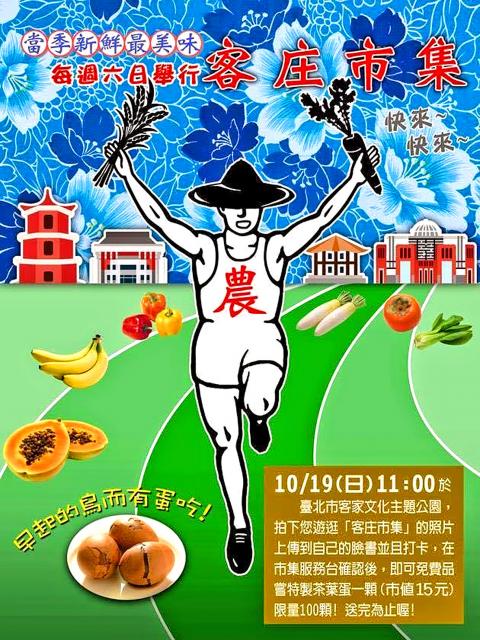The Taipei City Government’s Hakka Affairs Commission apologized and took down a billboard at 9pm on Wednesday, in response to criticism it resembled a renowned Ezaki Glico Co advertisement in Osaka, Japan, the sixth generation of which had been unveiled in the city that day.
The Ezaki Glico billboard, featuring a running man with his hands raised, has remained in place since it was first put up in 1935, undergoing multiple revisions to commemorate different events.
The company is a renowned sweets company based in Japan.

Photo: Internet screengrab
The commission’s Hakka Cultural Foundation admitted to a faulty review process and said it would reprimand the contracted company, adding that aside from posting an apology on Facebook, it would also apologize to Ezaki Glico through other channels.
Some netizens said they did not know what Japanese tourists would think of Taiwan if they had passed through the area.
Other netizens said they did not understand why the government would plagiarize a Japanese idea when Taiwan has excellent illustrators.

Photo provided by Internet user
The foundation said that the billboard was placed on the outer walls of the Hakka Cultural Park, adding that it had been subcontracted to a sales and promotion company.
The foundation said it was given a preview of the product, but had not realized that it was a copy of another product with such history, adding that it had immediately taken the billboard down, roughly nine hours after it was put up.
The foundation promised an internal review and said it would seek compensation from the company it subcontracted.

An essay competition jointly organized by a local writing society and a publisher affiliated with the Chinese Communist Party (CCP) might have contravened the Act Governing Relations Between the People of the Taiwan Area and the Mainland Area (臺灣地區與大陸地區人民關係條例), the Mainland Affairs Council (MAC) said on Thursday. “In this case, the partner organization is clearly an agency under the CCP’s Fujian Provincial Committee,” MAC Deputy Minister and spokesperson Liang Wen-chieh (梁文傑) said at a news briefing in Taipei. “It also involves bringing Taiwanese students to China with all-expenses-paid arrangements to attend award ceremonies and camps,” Liang said. Those two “characteristics” are typically sufficient

A magnitude 5.9 earthquake that struck about 33km off the coast of Hualien City was the "main shock" in a series of quakes in the area, with aftershocks expected over the next three days, the Central Weather Administration (CWA) said yesterday. Prior to the magnitude 5.9 quake shaking most of Taiwan at 6:53pm yesterday, six other earthquakes stronger than a magnitude of 4, starting with a magnitude 5.5 quake at 6:09pm, occurred in the area. CWA Seismological Center Director Wu Chien-fu (吳健富) confirmed that the quakes were all part of the same series and that the magnitude 5.5 temblor was

The brilliant blue waters, thick foliage and bucolic atmosphere on this seemingly idyllic archipelago deep in the Pacific Ocean belie the key role it now plays in a titanic geopolitical struggle. Palau is again on the front line as China, and the US and its allies prepare their forces in an intensifying contest for control over the Asia-Pacific region. The democratic nation of just 17,000 people hosts US-controlled airstrips and soon-to-be-completed radar installations that the US military describes as “critical” to monitoring vast swathes of water and airspace. It is also a key piece of the second island chain, a string of

The Central Weather Administration has issued a heat alert for southeastern Taiwan, warning of temperatures as high as 36°C today, while alerting some coastal areas of strong winds later in the day. Kaohsiung’s Neimen District (內門) and Pingtung County’s Neipu Township (內埔) are under an orange heat alert, which warns of temperatures as high as 36°C for three consecutive days, the CWA said, citing southwest winds. The heat would also extend to Tainan’s Nansi (楠西) and Yujing (玉井) districts, as well as Pingtung’s Gaoshu (高樹), Yanpu (鹽埔) and Majia (瑪家) townships, it said, forecasting highs of up to 36°C in those areas